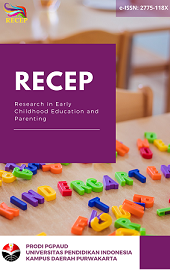PEMBINAAN KOMPETENSI GURU MELALUI PROGRAM INSERVICE TRAINING APE UNTUK PAUD
Abstract
Educational Game Tools (APE) can be one solution to optimize early childhood development. PAUD teachers need to have the skills to develop APE in accordance with learning objectives, one of which is through the community service program "Teacher Competency Development Through the APE Inservice Training Program for PAUD." The implementation of community service is carried out online involving a team consisting of lecturers and students. This program consists of two activities, namely webinars and APE development workshops. The participants of the webinar consisted of non-linear PAUD teachers and prospective PAUD teacher students. APE making guide is packaged in a video tutorial and uploaded to youtube. The APE making workshop was attended by participants divided into 10 groups with different materials, namely spin cocihizzle, smart box, butterfly metamorphosis puzzle, body parts printable for children, fun box, smart mini book, color fruits tower, three-sound drum, smart ball and japgar.
Alat Permainan Edukatif (APE) dapat menjadi salah satu solusi untuk mengoptimalkan perkembangan anak usia dini. Guru PAUD perlu memiliki keterampilan untuk mengambangkan APE sesuai dengan sasaran pembelajaran salah satunya melalui program pengabdian kepada masyarakat “Pembinaan Kompetensi Guru Melalui Program Inservice Training APE untuk PAUD” Pelaksanaan pengabdian kepada masyarakat dilakukan secara daring melibatkan tim yang terdiri dari dosen dan mahasiswa. Program ini terdiri atas dua kegiatan yaitu webinar dan workshop pengembangan APE. Peserta webinar terdiri dari guru PAUD non linear dan mahasiswa calon guru PAUD. Panduan pembuatan APE dikemas dalam video tutorial dan diunggah ke youtube. Workshop pembuatan APE diikuti oleh peserta yang terbagi pada 10 kelompok dengan materi berbeda yaitu spin cocihizzle, box pintar, puzzle metamorfosis kupu-kupu, body parts printable for children, fun box, mini book smart, menara colour fruits, drum tiga bunyi, bola pintar dan japgar.
Keywords
Full Text:
Hal 43-56References
Adams, D. M. 1975. Simulation Games: An Approach to Learning. Ohio: Jones Publishing Company.
Agustiana, N., Supriadi, N., & Komarudin, K. (2019). Meningkatkan kemampuan penalaran matematis dengan penerapan pendekatan bridging analogy ditinjau dari self-efficacy. Inovasi Pembangunan: Jurnal Kelitbangan, 7(1), 61-61.
AH, N. M. (2018). Penggunaan Alat Permainan Edukatif dalam Menstimulasi Perkembangan Fisik-Motorik Anak Usia Dini. SELING: Jurnal Program Studi PGRA, 4(2), 125-138.
Anjani, D. A., & Nurjanah, S. (2016). Permainan puzzle mempengaruhi perkembangan kecerdasan visual-spasial anak usia 4-5 tahun di Tk Al-Fath desa keboan anom Gedangan Sidoarjo. Journal of Health Sciences, 7(2).
Ariyanti, T. (2016). Pentingnya Pendidikan Anak Usia Dini Bagi Tumbuh Kembang Anak The Importance Of Childhood Education For Child Development. Dinamika Jurnal Ilmiah Pendidikan Dasar, 8(1).
Astini, B. N., Nurhasanah, N., & Nupus, H. (2019). Alat permainan edukatif berbasis lingkungan untuk pembelajaran saintifik tema lingkungan bagi guru paud korban gempa. Jurnal Pendidikan Anak, 8(1), 1-6.
Aziz, A. (2017). Implementasi inovasi pada model-model pendidikan anak usia dini di Taman Pengasuhan Anak (TPA) Serama Kementerian Kesehatan RI. Jurnal Pendidikan Usia Dini, 11(2), 201-214.
Fachrurrazi, A., & Bilad, A. U. (2023). MENGEMBANGKAN KEMAMPUAN KOGNITIF ANAK USIA 5-6 TAHUN DENGAN APE MEDIA AYAM BERTELUR. Jurnal Penelitian Multidisiplin Ilmu, 1(5), 941-946
Hasanah, U. (2019). Penggunaan Alat Permainan Edukatif (Ape) Pada Taman Kanak-Kanak Se-Kota Metro. AWLADY: Jurnal Pendidikan Anak, 5(1), 20-40.
Husain, A., Irmawati, I., & Paus, M. (2020). Peran Guru Dalam Mengoptimalkan Tugas-Tugas Perkembangan Pada Anak Usia Dini. Early Childhood: Jurnal Pendidikan, 4(1), 1-21.
Laili, R. A., Mintarsih, M., Astuti, M. D., & Susanti, M. T. (2017). Meningkatkan Kreativitas Anak Usia Dini Melalui Pembuatan Alat Permainan Edukatif (APE). Jurnal Penamas Adi Buana, 2(2), 41-48.
Marlina, S. (2016). Peningkatan Sikap Sosial Anak Usia Dini melalui Permainan Puzzle Buah di Taman Kanak-kanak Aisyiyah 1 Bukittinggi. Pedagogi: Jurnal Ilmu Pendidikan, 14(1), 104–114.
Mursalin, E., & Setiaji, A. B. (2021). Pelatihan Pembuatan Alat Permainan Edukatif (APE) Sains Sederhana bagi Guru PAUD. BAKTIMAS: Jurnal Pengabdian Pada Masyarakat, 3(4), 140-148.
Negara, I. G. N. M. K., & Darmawati, I. D. A. A. (2017). Hubungan Antara Sosio-Demografik Dan Pengetahuan Dengan Perilaku Orang Tua Dalam Pemilihan Alat Permainan Edukatif (Ape). Jurnal Riset Kesehatan Nasional, Vol. 1, No(90), 160–163.
Shunhaji, A., & Fadiyah, N. (2020). Efektivitas alat peraga edukatif (APE) balok dalam mengembangkan kognitif anak usia dini. Alim, 2(1), 1-30.
Streit, A. K. (2017). Analisa Permainan Edukatif Berbentuk Puzzle Dalam Bentuk Ilustrasi Tarian Indonesia. Rupa Rupa, 1(1).
Sulastri, R., & Fuada, S. (2021). Pelatihan Pembuatan Alat Permainan Edukatif (Ape) Berbahan Dasar Kardus Bekas Bagi Guru Paud Pada Masa New Normal. Buletin Udayana Mengabdi, 20(2), 136-147.
Susanti, D. A. (2019). Konsep belajar melalui bermain pada anak sejak usia dini. AL IBTIDA': Jurnal Program Studi Pendidikan Guru Madrasah Ibtidaiyah, 7(2), 120-135.
DOI: https://doi.org/10.17509/recep.v3i1.43406
Refbacks
Copyright (c) 2022 Research in Early Childhood Education and Parenting

This work is licensed under a Creative Commons Attribution-ShareAlike 4.0 International License.

This work is licensed under a Creative Commons Attribution 4.0 International License.



